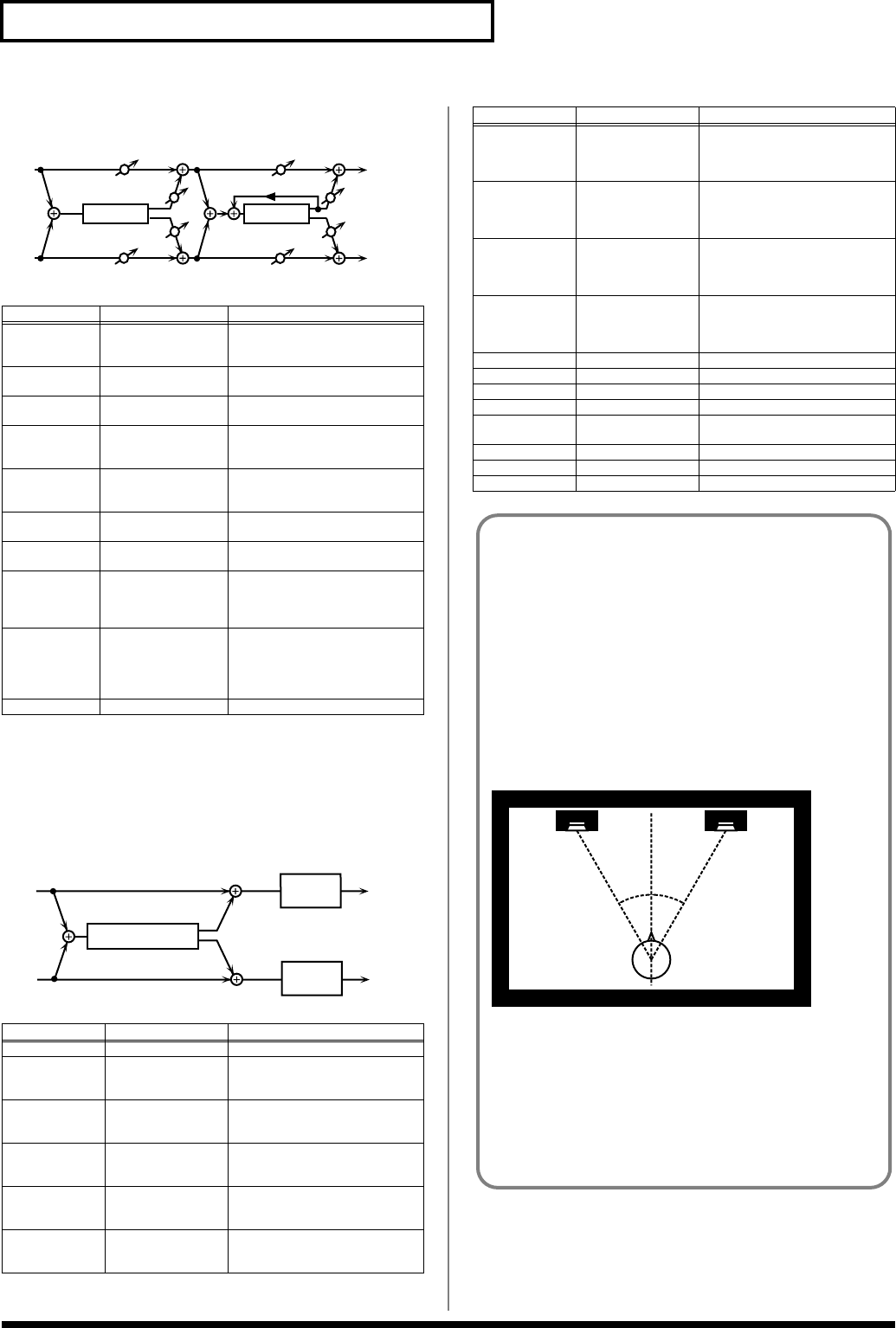
292
Effects List
77: CHORUS
→
FLANGER
fig.MFX-77
78: SYMPATHETIC RESONANCE
On an acoustic piano, holding down the damper pedal allows other
strings to resonate in sympathy with the notes you play, creating
rich and spacious resonances. This effect simulates these
sympathetic resonances.
fig.MFX-78
Parameter
Value Description
Chorus Pre
Delay
0.0–100.0 ms Adjusts the delay time from the
direct sound until the chorus
sound is heard.
Chorus Rate # 0.05–10.00 Hz, note Modulation frequency of the
chorus effect
Chorus Depth 0–127 Modulation depth of the chorus
effect
Chorus
Balance #
D100:0W–D0:100W Volume balance between the di-
rect sound (D) and the chorus
sound (W)
Flanger Pre
Delay
0.0–100.0 ms Adjusts the delay time from
when the direct sound begins
until the flanger sound is heard.
Flanger Rate # 0.05–10.00 Hz, note Modulation frequency of the
flanger effect
Flanger Depth 0–127 Modulation depth of the flanger
effect
Flanger
Feedback #
-98– +98 % Adjusts the proportion of the
flanger sound that is fed back
into the effect. Negative (-) set-
tings will invert the phase.
Flanger
Balance #
D100:0W–D0:100W Adjusts the volume balance be-
tween the sound that is sent
through the flanger (W) and the
sound that is not sent through
the flanger (D).
Level 0–127 Output Level
Parameter
Range Explanation
Depth #
0–127 Depth of the effect
Damper # 0–127 Depth to which the damper ped-
al is pressed (controls the reso-
nant sound)
Pre LPF 16–15000 Hz,
BYPASS
Frequency of the filter that cuts
the high-frequency content of the
input sound (BYPASS: no cut)
Pre HPF BYPASS,
16–15000 Hz
Frequency of the filter that cuts
the low-frequency content of the
input sound (BYPASS: no cut)
Peaking Freq 200–8000 Hz Frequency of the filter that
boosts/cuts a specific frequency
region of the input sound
Peaking Gain -15– +15 dB Amount of boost/cut produced
by the filter at the specified fre-
quency region of the input sound
Feedback
Flanger
L in
R in
L out
R out
Balance W
Balance W
Balance D
Balance D
Chorus
Balance W
Balance W
Balance D
Balance D
L in
R in
L out
R out
Syn. Resonance
3-Band
EQ
3-Band
EQ
Peaking Q
0.5, 1.0, 2.0, 4.0, 8.0 Width of the frequency region
boosted/cut by the ‘Peaking
Gain’ parameter (larger values
make the region narrower)
HF Damp 16–15000 Hz,
BYPASS
Frequency at which the high-fre-
quency content of the resonant
sound will be cut (BYPASS: no
cut)
LF Damp BYPASS,
16–15000 Hz
Frequency at which the low-fre-
quency content of the resonant
sound will be cut (BYPASS: no
cut)
Lid 1–6 This simulates the actual chang-
es in sound that occur when the
lid of a grand piano is set at dif-
ferent heights.
EQ Low Freq 200, 400 Hz Frequency of the low-range EQ
EQ Low Gain -15– +15 dB Amount of low-range boost/cut
EQ Mid Freq 200–8000 Hz Frequency of the midrange EQ
EQ Mid Gain -15– +15 dB Amount of midrange boost/cut
EQ Mid Q 0.5, 1.0, 2.0, 4.0, 8.0 Width of midrange (larger val-
ues make the region narrower)
EQ High Freq 2000, 4000, 8000 Hz Frequency of the high-range EQ
EQ High Gain -15–+15 dB Amount of high-range boost/cut
Level 0–127 Output Level
Parameter
Range Explanation
When Using 3D Effects
The following 3D effects utilize RSS (Roland Sound Space)
technology to create a spaciousness that cannot be produced by
delay, reverb, chorus, etc.
52: 3D DELAY
29: 3D CHORUS
30: 3D FLANGER
31: 3D STEP FLANGER
When using these effects, we recommend that you place your
speakers as follows. Also, make sure that the speakers are at a
sufficient distance from the walls on either side.
fig.33-002
If the left and right speakers are too far apart, or if there is too
much reverberation, the full 3D effect may not appear.
Each of these effects has an “Output Mode” parameter. If the
sound from the OUTPUT jacks is to be heard through speakers,
set this parameter to “SPEAKER.” If the sound is to be heard
through headphones, set it to “PHONES.” This will ensure that
the optimal 3D effect will be heard. If this parameter is not set
correctly, the full 3D effect may not appear.
30˚ 30˚
Fantom-X678_r_e.book 292 ページ 2005年5月12日 木曜日 午後4時40分


















